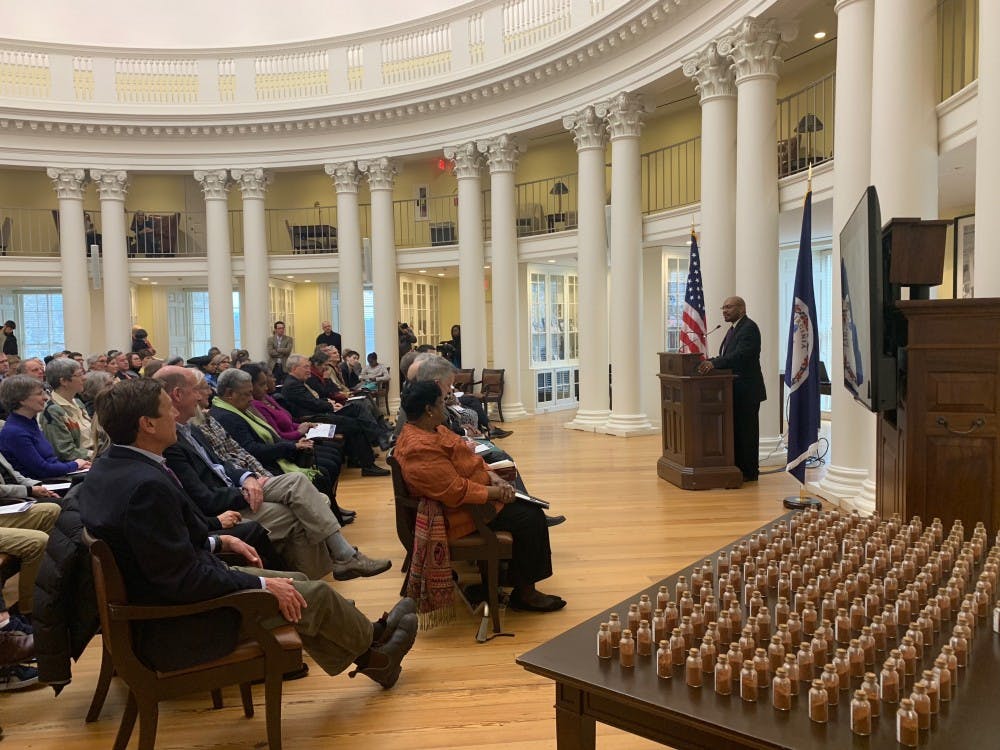The third annual Liberation and Freedom Day event was held Sunday afternoon in the Rotunda Dome Room. The annual event marks the anniversary of the end of slavery in Albemarle County and the City of Charlottesville, which occurred on March 3, 1865 when community members surrendered to incoming Union forces at the foot of Carr’s Hill.
Community attention to the anniversary in Charlottesville began in 2016 when City Council formed the Blue Ribbon Commission on Race, Monuments, and Public Spaces and charged it to redefine the narrative of racial relations in the City. The group called attention to the events of 1865, which led to City Council making a proclamation of observance for the day.
The event began with an interfaith service led by chaplains of United Ministries and opening remarks delivered by notable University and Charlottesville community members. These included Marcus Martin, the vice president and chief officer for diversity and equity, History prof. Kirt von Daacke, Siri Russell, the director of Albemarle County’s office of Equity and Inclusion and descendants of Sally Hemings.
A blessing ceremony featuring speeches and a musical performance by the Chapman Grove Baptist Church Music Ministry initially planned to be held at the site of the Memorial to Enslaved Laborers — a physical commemoration of the contributions of enslaved workers who built the University — instead took place in the Rotunda Dome Room due to inclement weather. About 100 people attended the event.
Attendants received small bottles of soil from the site of the memorial to commemorate the ceremony. The soil is likely the same soil type in the bricks used to construct the Academical Village.
First-year College students Isata Kamara and Fatimah Khan spoke at the event about the importance of reflecting on the past and commemorating enslaved laborers’ “sacrifices and struggles in the face of adversity.”
“As a student of color at the University, having this day to commemorate freedom and liberation makes me feel hopeful,” Khan said in an interview with The Cavalier Daily. “Hopeful for myself and the other students of the community, that we can act as agents of change to continue to understand the past, and build a better, more inclusive future.”
Kamara also discussed the significance of commemorating the liberation and freedom of enslaved people and said she wished the event had better and broader advertisement.
“Having events like this is especially important to me because it shows that not only do I belong, but my culture, my people, my history matters,” Kamara said. “My only regret in this event was that it was not advertised to the whole University and greater community as well as it should have been. I think a lot of people on Grounds would have appreciated the efforts that this event went to, but because this monumental moment in history was not given the attention it deserved, many people missed out.”
Martin delivered a message on behalf of University President Jim Ryan, who was unable to attend the event because of family plans at his son’s parents’ weekend. In his message, Ryan apologized for his absence and expressed his support for the celebration of Liberation and Freedom Day.
“I do want to express my gratitude to all of you for all the work you have done to make this day and the memorial a reality,” Ryan said. “We all serve to honor our past and it is my hope that it will shape our future, inspiring our values in making this community more diverse and inclusive.”
Von Daacke, the co-chair of the President’s commission on the University in the Age of Segregation, spoke about the importance of recognizing the University's history of slavery at the event.
“Staring in 1817, enslaved people began to work on preparing the area we are now standing in,” Daacke said. “We are here today to honor the thousands of people who demonstrated resilience, courage and dedication to family and community.”
Pastor Xavier Jackson from the Chapman Grove Baptist Church was in attendance and discussed the impact of the Liberation and Freedom Day event on the Charlottesville community in an interview with The Cavalier Daily.
“I think for the persons who were here, the impact had to be really great because all of the speakers or presenters were great, and just the moment, for us to be cognizant how things came about and now to acknowledge that this was done on slave labor,” Jackson said. “And now to try to correct and erect a memorial in their honor is just a blessing for everyone that will pass this way and see it for years to come.”
Patsy Goolsby, a University alumna and bookstore employee, said she attended the memorial to “to be part of making a difference.” She also talked about the event of in the context of the Unite the Right rally of August 2017 where white supremacist protesters marched on the Lawn and downtown Charlottesville, killing Charlottesville resident Heather Heyer and injuring dozens more.
“I was here on July 8 and marched with a clergy collective against the Klan,” Goolsby said. “I happened to be out of town on Aug. 12, but you know, U.Va., this community, the people, are better than that, and there are some really good people in this room.”







